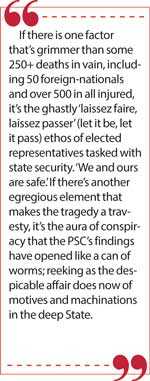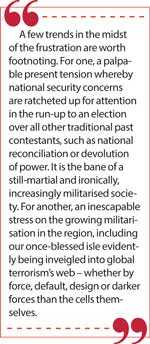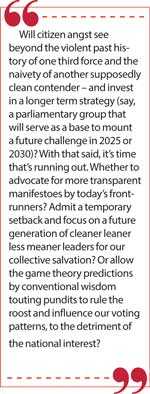Wednesday Feb 18, 2026
Wednesday Feb 18, 2026
Tuesday, 29 October 2019 00:20 - - {{hitsCtrl.values.hits}}

What is past is past … except when it makes the present – and future – tense. The findings of the Parliamentary Select Committee (PSC) probing the Easter Sunday attacks of April 2019 has set several cats among the pigeons. On one hand, it feels like taxpayers’ money is being wasted when simplistic  recommendations (but more later) that a schoolchild could suggest are presented as sage remedies. On the other, the assignation of blame and/or responsibility leaves an already-knowing public breathless, speechless and hopeless about the defence of the realm.
recommendations (but more later) that a schoolchild could suggest are presented as sage remedies. On the other, the assignation of blame and/or responsibility leaves an already-knowing public breathless, speechless and hopeless about the defence of the realm.
Death by breathlessness
That the PSC has found its whipping boy in the SIS Director is not surprising for a political culture that typically blames flunkeys or functionaries when fundamental leadership praxis fails. Of course, previously it was the then-incumbent Defence Secretary and in-situ IGP who were almost exclusively pilloried to whitewash the political side of the defence establishment. It may be that these worthies are not entirely blameless. But after six months of waiting, and five since the PSC was mooted, all that has transpired is that the public has had its worst suspicions confirmed.
Now we know for sure that the dastardly attacks would most likely have been prevented – at least mitigated – if the President hadn’t played politics with the National Security Council (NSC), the Prime Minister had not behaved like a recalcitrant schoolboy who’s not included in an elite club, and he together with the absentee State Defence Minister had exposed these shenanigans, rather than holding their peace in order to grind a political axe for partisan mileage later. At least, that’s the charitable view … in this milieu, post the PSC’s ponderous sharing, conspiracy theories abound.
If there is one factor that’s grimmer than some 250+ deaths in vain, including 50 foreign-nationals and over 500 in all injured, it’s the ghastly ‘laissez faire, laissez passer’ (let it be, let it pass) ethos of elected representatives tasked with state security. ‘We and ours are safe.’ If there’s another egregious element that makes the tragedy a travesty, it’s the aura of conspiracy that the PSC’s findings have opened like a can of worms; reeking as the despicable affair does now of motives and machinations in the deep State. ‘Let’s make the most mileage for myself out of this mess.’ 
After half a year, the answers to our questions (“Cui bono?” – who benefits?) have raised more doubts than laid the ghosts of complicity and collusion to rest. Was it ISIS at all? Who triggered the sleeping cells? Why these targets? Who kept quiet, stayed away, delayed action? Who leaped into the breach in a brilliantly orchestrated bit of macabre pre-election propaganda?
To add injury to insult, the PSC’s pointed recommendations, as regards employing nanny-state technology to keep tabs on citizens, reek of a surveillance culture that’s more People’s Republic than Democratic Socialist Republic. But funnily enough, it would resonate with presidential candidates who’ve made national security one of their main planks. The plot thickens.
Speechless with ire
Also none of the players in this imbroglio come out smelling of anything but rank negligence of the national interest and pausing only to smell the flowers of unenlightened self-interest.
The President, for all his (or our) pains, gets to retire in clover – if not glory, which he hardly deserves. Interestingly, it’s his victims in the unconstitutional aborted coup of 2018 who are making votive offerings of retirement benefits to the tune of nine-figure taxpayer millions. Impunity 365: Accountability 0!
The Prime Minister, like some odious unstable isotope, gets a radioactive half-life as Premier under a putative UNP presidency – if his dark horse leader doesn’t pull a rabbit or mangy dog out of a hat and surprise us all with an alternative No. 2 in Cabinet. Pity the Premier seems perennially incapable of keeping his promises to those afflicted by a previous regime. But by his inaction, he kowtows to cabals whose interests he seemingly protects, while whimpering about democracy being our fight too, not only his. How sharper than a serpent’s tooth this thankless duffer?
The Opposition leader is probably too busy engineering mechanical and locomotive union action, as well as nauseatingly gaseous strikes, to care for anything more than accruing maximal benefit to his own vaulting ambition and that of his scions from his brother’s budding presidency. And that latter worthy – we use the term with little regard for badinage in Hansard – had nailed his colours to the mast long before the PSC had deigned to point fingers. But he may be hoisted with his own petard for all the good it will do the dead and dying.
Hope – the thing without feathers
A few trends in the midst of the frustration are worth footnoting.
For one, a palpable present tension whereby national security concerns are ratcheted up for attention in the run-up to an election over all other traditional past contestants, such as national reconciliation or  devolution of power. It is the bane of a still-martial and ironically, increasingly militarised society. For another, an inescapable stress on the growing militarisation in the region, including our once-blessed isle evidently being inveigled into global terrorism’s web – whether by force, default, design or darker forces than the cells themselves. Some would decry this allegation as self-serving sensationalism. Other, perhaps more realistic voices would fall silent in the face of incontrovertible evidence or lacking that, clips and commentary on scurrilous social media.
devolution of power. It is the bane of a still-martial and ironically, increasingly militarised society. For another, an inescapable stress on the growing militarisation in the region, including our once-blessed isle evidently being inveigled into global terrorism’s web – whether by force, default, design or darker forces than the cells themselves. Some would decry this allegation as self-serving sensationalism. Other, perhaps more realistic voices would fall silent in the face of incontrovertible evidence or lacking that, clips and commentary on scurrilous social media.
Then again, the ostensible oversight Parliament has over the Executive is a welcome check and balance under a constitutional ethos that has for too long been weighted in favour of the President over his Ministers and the Executive over the other two branches of Government. There is also the sense that the old order changes: with President and perhaps Prime Ministers or Opposition leaders passing on or at the very least exchanging hands after the blame game is done and dusted. And society now feels freer than ever to critique, condemn and generally heap calumny on the heads of the not-so-venerable greybeards who are seen to be tottering out of political contention.
In the midst of all of this, a militarisation of the State apparatus appears to be the albatross that Sri Lanka can’t still quite shake off. We had all hoped that successive administrations would heed the ancient wisdom of turning swords into ploughshares. But we’ve been let down as a polity and a people by the very representatives we elect, playing personal and partisan politics rather than planting seeds for the future – to say nothing of their own posterity.
That dynastic ambitions first, and more ambiguous democracy after it, have compromised if not crippled the country’s chances at that elusive national reconciliation have been demonstrated by Mahinda’s militarism and Maithripala’s meddlesome muddling respectively. Let’s not even mention – as the PSC has done, intriguingly – the all-round absenteeism and apathy of a certain Mr Clean and his mediocre henchmen. Their incompetence in the Easter Sunday shambles – if not their collusion and complicity – is a travesty of justice and the tragedy of transitional justice being hijacked by darker more dastardly agendas in the deep state.
Past, present, future tense
So national security still rules the day on the surface of things, and it is a reality to be rued and regretted. It is a spectre to be feared, especially if one is a minority or other marginalised community in our isle today. Particularly if the PSC’s pointed recommendations (perhaps more sinister than simplistic, on second thought) result in curbing security risks at the expense of civil rights. Meanwhile…
The greens have marshalled around an old faithful of theirs to field a suggestion that if elected, their populist young prince will not have to resort to Machiavellian subterfuge like patrician Ranil to ensure  the safety of the republic. The blues have built a technocratic edifice around their bulldog of an erstwhile strongman-bureaucrat, whose reassurances about discipline are only slightly less threatening than his assurances on letting loose yesteryear’s “wrongly-imprisoned” military intelligence operatives are terrifying. And the fielding of a former army commander by an independent contender – “There but for the grace of God goes Gota or that other General, er Field Marshal” – sends a strong signal (perhaps the wrong one: because food, flood and financial security are not necessarily factored into their formula) showcasing the weakness in their strength.
the safety of the republic. The blues have built a technocratic edifice around their bulldog of an erstwhile strongman-bureaucrat, whose reassurances about discipline are only slightly less threatening than his assurances on letting loose yesteryear’s “wrongly-imprisoned” military intelligence operatives are terrifying. And the fielding of a former army commander by an independent contender – “There but for the grace of God goes Gota or that other General, er Field Marshal” – sends a strong signal (perhaps the wrong one: because food, flood and financial security are not necessarily factored into their formula) showcasing the weakness in their strength.
So Sri Lanka, while parties parade their candidates and personages complete the charade with their puffery, the storm clouds (and I don’t mean inclement unseasonal weather) herald an adverse climate over the island for half a decade – at least – ahead. If you and I are convinced that we’re hobbled by Hobson’s choice – a Grim Reaper on the one hand, a Sordid Populist on the other – then all hope is already lost. But if, like national disaster warning agencies or global warming climate change activists, we’re willing to take the longer view in playing even the shorter game … well, perhaps that thing without feathers may still serve! There are some alternatives to choosing what Colombo liberals are pleased to call “the lesser of the two evils”. Will citizen angst see beyond the violent past history of one third force and the naivety of another supposedly clean contender – and invest in a longer term strategy (say, a parliamentary group that will serve as a base to mount a future challenge in 2025 or 2030)?
With that said, it’s time that’s running out. Whether to advocate for more transparent manifestoes by today’s frontrunners? Admit a temporary setback and focus on a future generation of cleaner leaner less meaner leaders for our collective salvation? Or allow the game theory predictions by conventional wisdom touting pundits to rule the roost and influence our voting patterns, to the detriment of the national interest? So Sri Lanka it is, then…
Journalist | Editor-at-large of LMD | Writer #SpeakingTruthToPower